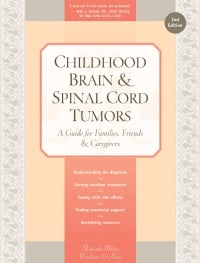Childhood Brain and Spinal Cord Tumors
Chapter 24: Death and Bereavement
The loss of my son has illuminated for me the true definition of love: the giving of oneself, body and spirit, to another. His death, like that of any child, is a story of withered hopes and unfulfilled dreams. In this book I have tried to capture a few remembered strains of the brief, glad music of his life. These are all I have of him now, and they comfort me even as they break my heart.
— Gordon Livingstone, MD
Only Spring
THE DEATH OF A CHILD causes almost unendurable pain and anguish for the loved ones left behind. Death from a brain or spinal cord tumor comes after months or years of debilitating treatment, emotional swings, and financial crises. The family begins the years of grief already exhausted from the years of fighting the tumor. It is truly every parent’s worst nightmare.
In this chapter, many parents share their innermost thoughts and feelings about their decisions to transition from active treatment, to involve hospice, to choose death at home or in the hospital, and experiencing grief. It made no difference whether parents had recently lost a child or whether it happened decades before—tears flowed when talking about their family’s experience. Because family members and friends can be strong sources of support, or casualties of the grieving process, parents describe words and actions that help, and they offer suggestions about what words and actions to avoid. Grief has as many facets as there are grieving parents; what follows are the experiences of a few.
Table of Contents
All Guides- Introduction
- 1. Diagnosis
- 2. The Brain and Spinal Cord
- 3. Types of Tumors
- 4. Telling Your Child and Others
- 5. Choosing a Treatment
- 6. Coping with Procedures
- 7. Forming a Partnership with the Treatment Team
- 8. Hospitalization
- 9. Venous Catheters
- 10. Surgery
- 11. Chemotherapy
- 12. Common Side Effects of Chemotherapy
- 13. Radiation Therapy
- 14. Peripheral Blood Stem Cell Transplantation
- 15. Siblings
- 16. Family and Friends
- 17. Communication and Behavior
- 18. School
- 19. Sources of Support
- 20. Nutrition
- 21. Medical and Financial Record-keeping
- 22. End of Treatment and Beyond
- 23. Recurrence
- 24. Death and Bereavement
- 25. Looking Forward
- Appendix A. Blood Tests and What They Mean
- Appendix C. Books and Websites

